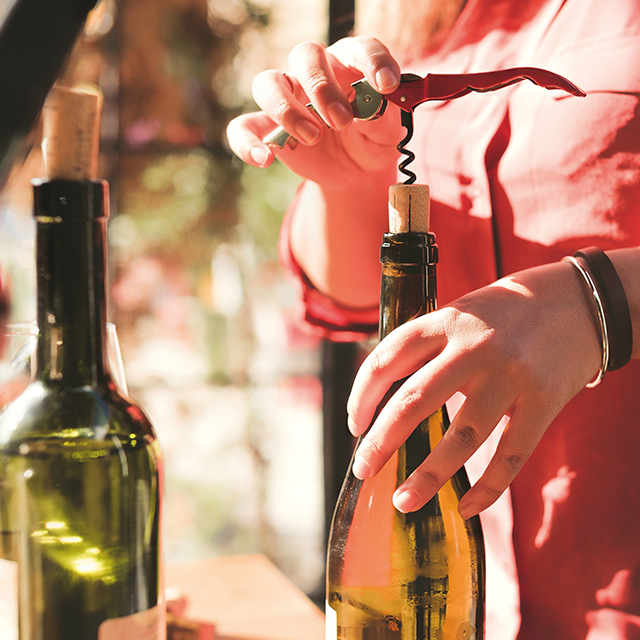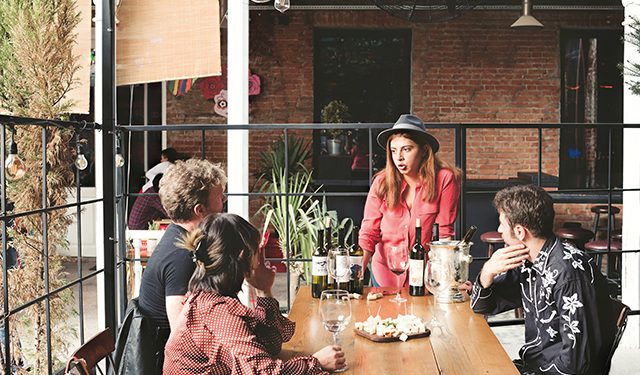With formality, often comes pretension. In an age of label worship and stereotypical methods of education, the wine industry is craving a change.
If you haven’t heard the chatter about Georgian wine being the next big thing, which rock have you been hiding under? With some of the oldest wine-making traditions in history, Georgian natural wines, or Qvevri wines, are popping up on restaurant menus all over the world. Yet, so many of the smaller, local wineries are going unnoticed. Nina Naskidashvili, founder of Rebel Sommelier, talks to us about how her concept helps to address this pivotal gap in the market.
Tell us about Rebel Sommelier and how you came up with the concept.
In 2018, I moved to New York. When I met new people, I would always talk about my passion for Georgian Qvevri wines, share bottles with them, and tell the stories behind each bottle.
A year later, when I was back in Georgia, I was eager to learn more about Georgian wine myself. I decided to embark on a new career path. The idea was very simple: to share my passion for natural wine with people.

Georgia has an impressive 8,000 years of wine-making history, together with 525 unique grape varieties, and I wanted to tell the world about it, in an alternative format. Rebel Sommelier embodied the vision of myself being an ambassador of natural Georgian wine.
When you travel to Georgia and want to taste the local wine, your options are kind of limited. Sure, you have bars, restaurants, tourism associations, hotels, wine tours, all of them mostly very formal and lacking innovation; it is also mostly the bigger wines promoted. Yet, to indulge in the joys of small, family-owned wineries with deep roots in Georgian tradition, one must delve deeper. More than everything, the identity of Rebel Sommelier is about natural Georgian wine. Natural wine is about minimal intervention.
Georgians knew no other method but that, we never even labeled our bottles as “natural wine”, because all wine was natural. During Soviet and even Post-Soviet times, this ancient winemaking tradition was cast out to the point of almost disappearing, and I felt like it was very important for me to promote my country and its ‘naked’ wine.
In 2019, I organized a couple of tastings. Soon afterwards, I was accepted for my Master’s program and moved to Paris. At this stage, Rebel Sommelier took a Covid break, and I am currently in the process of moving the project to Paris.
What makes Georgian wine unique compared to other wines available on the European market?
Europeans, the French in particular, have discovered that the Georgian terroir is full of forgotten wine secrets and grape varieties with strong character. Wine import figures in France are growing, as well as Georgian wine visibility. Restaurants in Paris are eager to have Georgian natural wine on their menus. There are already six Georgian restaurants in Paris and a Georgian Natural Wine bar.
Europeans have discovered that the Georgian terroir is full of forgotten wine secrets and grape varieties with strong character
France is very fond of the fact that, in recent years, more and more women have been making wine independently in Georgia, carving a niche in a sector which was previously dominated by men.
Why do you think it’s important to introduce the people of Europe to small, family-owned Georgian wineries?
In order to help generate further wine exports in a post-Covid economy, it is vital to promote small wineries to help them to continue operating, as well as to help continue the ancient winemaking legacy.
The farming crisis in Georgia is huge. Originally, Georgia had over 1,400 indigenous grape varieties, but today there are only 525. They had no resources to continue and would give up their land to move to the capital to make ends meet. Luckily, there’s a new trend which is seeing young people returning to their villages and continuing the family business of making wine.
Where do you see your business going forward? Can you envisage it becoming a success in the US too?
Right now, I’m focused on France. Originally, the project was meant to happen in Europe as a whole, but it’s too time consuming to manage while holding down a full time hospitality job in Paris.
To help generate further wine exports in a post-Covid economy, it is vital to promote small wineries
I stay connected with my American friends in the wine industry, and I notice a lot of curiosity from them about Georgian wine. It makes me proud that Georgian wine is coming back. I would probably have to go back to the US and see what the market requires. The American wine industry is fascinating to me in a lot of ways.
Do you think projects such as yours are pivotal in helping promote Georgian produce?
It is crucial, because these types of projects raise the visibility of producers in general. Someone that tastes wine at my event will purchase the same bottle in the US tomorrow, and so on. It’s all word of mouth and works well for the wineries working on their digital concepts. This way, the consumer can buy and ship from anywhere, and it all goes back to the country’s economy.
How does Rebel Sommelier create a unique experience for its customers? Is there anything else similar on the market?
There are a lot of wine startups involving wine tours, but they don’t provide a personal, informal experience, and the format is mostly the same. I don’t want a snobbish sommelier in a white shirt and suit at a Michelin star restaurant pouring me wine: I want to be the Mick Jagger of the wine industry!
When I go to a restaurant, I always choose an honest, transparent and down to earth kitchen, a place where the chef will come out of the kitchen and talk to the guests about food, like a long-lost friend. In those places, you’re part of an experience, and I wanted to do the same with wine!
Tasting sessions take place in different locations and the wine list is always different too, it helps to keep it exciting and you can taste a lot of bottles at the same time.
Interview by Tamzin Whitewood














